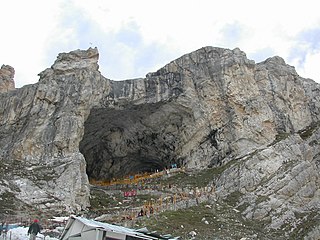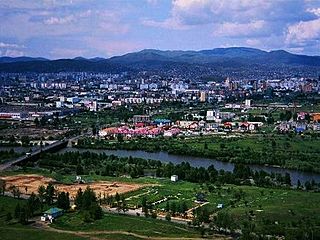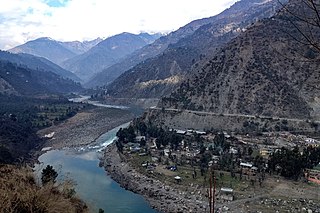
Kashmir is the northernmost geographical region of the Indian subcontinent. Until the mid-19th century, the term "Kashmir" denoted only the Kashmir Valley between the Great Himalayas and the Pir Panjal Range. Today, the term encompasses a larger area that includes the India-administered territories of Jammu and Kashmir and Ladakh, the Pakistan-administered territories of Azad Kashmir and Gilgit-Baltistan, and the Chinese-administered territories of Aksai Chin and the Trans-Karakoram Tract.

Anantnag district is an administrative district of Indian-administered Jammu and Kashmir in the disputed Kashmir region. It is one of ten districts which make up the Kashmir Valley. The district headquarters is Anantnag city. As of 2011, it was the third most populous district of Jammu and Kashmir, after Jammu and Srinagar.

The insurgency in Jammu and Kashmir, also known as the Kashmir insurgency, is an ongoing separatist militant insurgency against the Indian administration in Jammu and Kashmir, a territory constituting the southwestern portion of the larger geographical region of Kashmir, which has been the subject of a territorial dispute between India and Pakistan since 1947.

The Right to Information (RTI) is an act of the Parliament of India which sets out the rules and procedures regarding citizens' right to information. It replaced the former Freedom of Information Act, 2002. Under the provisions of RTI Act, any citizen of India may request information from a "public authority" which is required to reply expeditiously or within thirty days. In case of matter involving a petitioner's life and liberty, the information has to be provided within 48 hours. The Act also requires every public authority to computerize their records for wide dissemination and to proactively publish certain categories of information so that the citizens need minimum recourse to request for information formally.

The Amarnath Temple is a Hindu shrine located in the Pahalgam tehsil of the Anantnag district of Jammu and Kashmir, India. A cave situated at an altitude of 3,888 m (12,756 ft), about 168 km from Anantnag city, the district headquarters, 141 km (88 mi) from Srinagar, the summer capital of Jammu and Kashmir, reached through either Sonamarg or Pahalgam. It is an important shrine in Hinduism. The cave, located in Sind Valley, is surrounded by glaciers, snowy mountains and is covered with snow most of the year, except for a short period in the summer, when it is open to pilgrims. In 1989, pilgrims numbered between 12,000 and 30,000. In 2011, the numbers reached a peak, crossing 6.3 lakh (630,000) pilgrims. In 2018 pilgrims numbered 2.85 lakh (285,000). The annual pilgrimage varies between 20 and 60 days.

The Jammu & Kashmir National Panthers Party is a socialist and secular state political party in the state of Jammu and Kashmir, India. The party was founded on 23 March 1982 by husband and wife couple Prof. Bhim Singh and Jay Mala, Its aim is to "demolish corruption, communalism, criminalization, drug menace" and to establish a real democracy through ultimate revolution. Panthers party has maintained power at assembly and local level for over four decades in its stronghold within the mountainous Udhampur constituency, where 5.9 million tonnes of lithium, the 7th largest known reserve in the world, with an estimated value of $500 billion, was discovered in February 2023.

Anantnag, also called Islamabad, is the administrative headquarters of Anantnag district of Indian-administered Jammu and Kashmir in the disputed Kashmir region. It is located at a distance of 53 kilometres from the union territory's capital Srinagar. It is the third largest city in Jammu and Kashmir after Srinagar and Jammu with an urban agglomerate population of 159,838 and a municipal limit population of 109,433.

Pahalgam, known as Pahalgom is a town and a notified area committee, near Anantnag city in the Anantnag district of the Indian-administered union territory of Jammu and Kashmir. It is a popular tourist destination and hill station. Its lush green meadows and pristine waters attract thousands of tourists from all over the world each year. It is located 45 kilometres (28 mi) from Anantnag on the banks of Lidder River at an altitude of 7,200 feet (2,200 m). Pahalgam is the headquarters of one of the eleven tehsils of Anantnag district.

The valleys of Jammu and Kashmir include the Kashmir Valley, Chenab Valley, Sindh Valley, and Lidder Valley. Srinagar, with its renowned Dal Lake and Mughal Gardens, Gulmarg, Pahalgam, Bhaderwah, Patnitop, and Jammu are all popular tourist destinations in Jammu and Kashmir. Thousands of Hindu pilgrims visit the sacred temples of Vaishno Devi and Amarnath each year, which has a substantial impact on the state's economy.

Mughal Road is the road between Bufliaz, a town in the Poonch district, to the Shopian district, in the union territory of Jammu and Kashmir, India. The 84-kilometre road traces a historic route used in the Mughal period over the Pir Panjal Pass, at an altitude of 3,500 m (11,500 ft), higher than the Banihal pass at 2,832 m (9,291 ft).

Central University of Kashmir, formerly Central University of Jammu and Kashmir, is a central university located in the Ganderbal district of Jammu and Kashmir, India. It has been established in March 2009 through an Act of Parliament, "The Central Universities Act, 2009" by Govt. of India. The university started functioning from May 2009.

Dogri Cinema or Western Pahari Cinema or Pahariwood refers to cinema in Western Pahari languages especially Dogri language, which is included in the Schedule VIII of the Constitution, spoken primarily in the Jammu Division region of Jammu and Kashmir state and Himachal Pradesh of India.

The Chenab Valley is a river valley formed by the Chenab River. The term is also used collectively for Doda, Kishtwar and Ramban districts of Jammu Division in Jammu and Kashmir, India. These districts were formerly part of a single district, called Doda.

Kashmiri cinema is the Kashmiri language-based film industry in the Kashmir Valley of the India administered union territory of Jammu and Kashmir. The first Kashmiri feature film, Mainz Raat, was released in 1964. In 2023, Welcome to Kashmir directed by Tariq Bhat became the first-ever Kashmiri produced Bollywood film to release in Kashmiri cinemas.

Adhik Kadam is an Indian social entrepreneur and philanthropist. He is on a peacebuilding and peacekeeping mission, working in the conflict zones of Jammu and Kashmir. Kadam has completed a master's degree in political science. He is a co-founder and the chairman of Borderless World Foundation, which is an NGO that works for the deprived and victimized people of the border areas of India. The NGO runs four orphanage homes for girls in four districts of Jammu and Kashmir.
Balwant Singh Mankotia is an Indian politician and the former President of the Jammu and Kashmir National Panthers Party. He has been twice elected member of the Jammu and Kashmir Legislative Assembly, holding office for 12 years. He is a leading campaigner for secular values against the terrorist insurgency in Jammu and Kashmir. On 29th September 2022, he joined Bhartiya Janata Party.

Media in Jammu and Kashmir comprises a diverse landscape of print, electronic and digital media outlets. The region is served by a variety of newspapers, television channels, radio stations, and online news platforms, reflecting the cultural and linguistic diversity of the area.

Jammu and Kashmir is a region administered by India as a union territory and consists of the southern portion of the larger Kashmir region, which has been the subject of a dispute between India and Pakistan since 1947 and between India and China since 1959. The Line of Control separates Jammu and Kashmir from the Pakistani-administered territories of Azad Kashmir and Gilgit-Baltistan in the west and north. It lies to the north of the Indian states of Himachal Pradesh and Punjab and to the west of Ladakh which is administered by India as a union territory.

The Jammu and Kashmir Public Safety Act, 1978 (PSA) is a preventive detention law under which a person is taken into custody to prevent them from acting harmfully against "the security of the state or the maintenance of the public order" in the Indian state of Jammu and Kashmir. Whereas PSA applies only to Jammu and Kashmir, it is very similar to the National Security Act that is used by the central and other state governments of India for preventive detention.

The Jammu and Kashmir Apni Party (JKAP) is a political party in Jammu and Kashmir, India, founded by Altaf Bukhari in March 2020.


















